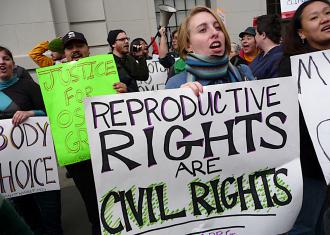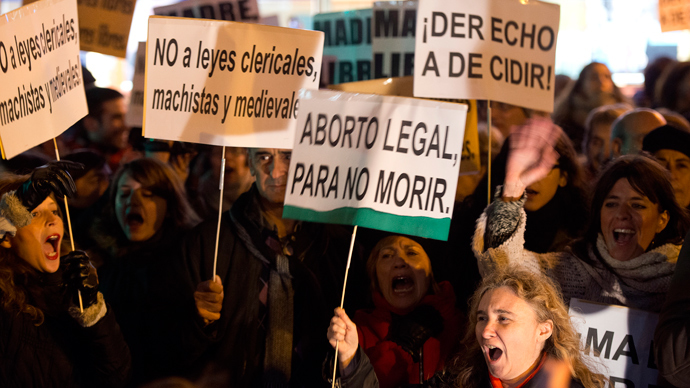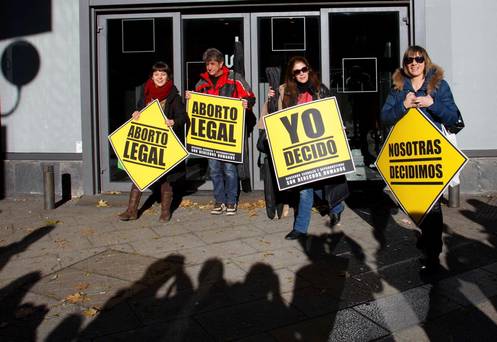by Sandra Ezquerra
January 29, 2014
This article was originally published on International Viewpoint and on the author’s blog. We republish it here with an introduction by Solidarity member Dianne Feeley.
Introduction (by Dianne Feeley)

Since 2010 state legislators in the U.S. have passed more than 200 laws restricting U.S. women’s reproductive rights. Just last year 22 states implemented 70 laws. These increased restrictions on clinics, prohibited contraceptive and abortion coverage in various insurance plans, and banned abortions at 20-22 weeks, before fetal viability. Last year Indiana and Wisconsin passed mandatory, often invasive and unnecessary, ultrasounds for all seeking abortion. Nine states followed Michigan’s lead in forbidding teleconferencing for medical abortions, although no state has eliminated teleconferencing for any other medical procedure.
Some legislators think the time is ripe for challenging Roe v. Wade, the U.S. Supreme Court decision that legalized abortion in 1973. A subsequent decision, Casey v. Planned Parenthood (1992) already weakened the original ruling by allowing restrictions on women’s rights as long as they were not “undue” burdens. A 24-hour waiting period, parental consent, and even providing misinformation fit under that “undue” burden category.
Legislators in Louisiana, Mississippi, North Dakota, and South Dakota announced that if Roe were overturned, they would move to ban abortion outright. Eight others promised to restrict abortion to the maximum extent allowed.
Battered by restrictive laws and right-wing propaganda, U.S. women and their allies continue to fight defensive battles at the local level. But the restrictions are not limited to the United States—they are being proposed by legislatures internationally.
The Most Retrograde of Three Reforms in 30 Years
On 20 December, the Spanish Popular Party government (right wing) made public the draft of the “Law for the protection of the life of the unborn and the rights of the pregnant woman.” As the feminist movement and a broad spectrum of the left has been explaining since then the new law, if approved, would be the most important attack in the field of sexual and reproductive rights in the Spanish state since the Franco dictatorship.
It would be the third change in abortion legislation to be made in the past thirty years. The first came with the 1985 law, passed during the PSOE (Socialist Party) government after passing through the Constitutional Court, which kept abortion in the Criminal Code and only allowed it in three circumstances and within certain deadlines: rape up to 12 weeks, foetal malformations up to 22 weeks and risks to women’s physical and mental health without a time limit. Although this law was an improvement on the previous one, the feminist movement in the Spanish State continued fighting for free abortion. That is, for total decriminalization and and performed within the public health system without any constraint or limitation.
The PSOE took 25 years to hear these demands and did not want to listen to all of them. Late and half-baked, in 2010 they passed a law establishing a period of 14 weeks during which women could terminate a pregnancy without giving any reason or justification. In cases of foetal malformation or threat to the woman ’s health, she could obtain permission to terminate pregnancy up to week 22. Besides keeping abortion in the Criminal Code, the PSOE did not dare antagonize the Spanish right regarding the regulation of conscience objection by public health professionals, preventing women under 18 to have access to termination without their parents’ knowledge, and imposed, among other obstacles, a three-day thinking period between the moment that the woman saw a doctor to request an abortion and the termination itself. Then the Popular Party again referred the law to the Constitutional Court, where it still is.
After coming into power in 2011 and the designation of Alberto Ruiz Gallardón as Minister of Justice, the Popular Party announced they would change the law in the first half of its legislature. Since then there have been numerous statements by Gallardón in which he claimed that “motherhood is what makes women real women” (sic) and promised to end the anti -life PSOE law. The past two years have been plagued by rumours and opacity with respect to this law. During this time the government has indicated several times that they intended to return to the 1985 law but removing the foetal malformation grounds. The argument made for this was not discriminating between first and second class foetuses and that the presence of functional diversity is no legitimate reason to prevent a human being from being born. In the meantime, of course, they have been cutting out social aid and services, including the newborn dependency law and other benefits for so-called restricted autonomy. During this time, within the feminist movement, we have been fearing the worst. Reality, nevertheless, has exceeded our worst nightmares.

AFP Photo
According to the information the government has released so far, the new law would eliminate the 14-week deadline of “free abortion” and would only allow abortion in two cases: when the woman has been raped, but only during the first 12 weeks and provided a prior police report has been filed. Although it remains to be seen what the language will finally be, it seems that the pregnant woman will also have to prove that having a child as a result from sexual assault would be a hazard for her physical or mental health. It thus places the burden of proof on women, who do not only have to “do the right thing and go to the police” but also demonstrate that the rape has caused them serious damage.
The second assumption is that of risk of physical or psychological health of women. In this case women could get an abortion up to 22 weeks. The grounds of foetal malformation, therefore, disappear and this reason could only be argued if the anomalies are incompatible with life and only if that “unbearable pressure”, as Gallardón phrased it, cannot be psychologically borne by the woman. If the malformation is discovered after the 22-week period labour should be induced. These issues, furthermore, need to be identified by two different specialists: one to diagnose the foetal malformation and the other one to psychologically analyse the pregnant woman. These two professionals, in turn, cannot work in the same facility as that where the abortion would be performed.
Moreover, in both case women should undergo a process of “informed, free, and validly issued consent”. This includes participation of parents in minors’ decisions, as well as a seven-day reflection period after being informed about “their rights, aid, assistance options, clinical information and alternatives to abortion”.
The draft, therefore, restricts the access to abortion even more than the 1985 law. It does not only remove the grounds of foetal malformation but it also imposes multiple barriers to access by any professional required to participate in the intervention without limit or regulation and, of course, it will bring back clandestine abortion or travel to countries where it can be done legally.
Massive Opposition to the Bill
The voices raised against this bill are numerous and range from the feminist movement and health professionals to many sectors of the left. In fact, dissension has started even within the Popular Party. The proposed reform is undoubtedly one of the most serious attacks, if not the most serious, to women’s rights since Franco’s dictatorship, and it is not a result of any social request or consensus. The PP is thus fulfilling its worst threats, making the most conservative and recalcitrant sectors of the Spanish Catholic Church happy.
It is impossible to predict whether the PP will accelerate the approval of the law or will seek support. On the one hand, an absolute majority in Congress would allow them to just impose it as they have done with many other reforms and cutbacks in social rights. On the other hand, since its content was made public, there has been enormous criticism of the law and it is becoming increasingly clear that it has no support beyond the toughest right wing of the Popular Party. It remains to be seen whether the most liberal sector will break the internal discipline or to what extent the government itself stands up to the criticism coming from everywhere around the country and even internationally. It also remains to be seen how long it takes for the law to be adopted through parliamentary procedures and to what extent the Popular Party wants to have this ball in its hands during the campaign for the European elections in May.
We Must Stop This Law

Despite the opportunism with which the PSOE is criticizing the reform, it is clear that we are in a moment in which it is crucial to build a broad movement that opposes the law and whose main goal is to stop it. The left should place once and for all this issue at the centre of its political agenda and social movements should give full support to feminism. I am absolutely sure that if we join forces we can put a stop to the government’s plans. We can, and we must.
That does not mean, however, that we agree on everything. Of all the changes introduced by the reform, the one that has occupied the most news headlines in recent weeks has been the removal of the foetal malformation grounds. Regarding this, although I do not doubt for a moment that is a terrible act of cruelty and hypocrisy of a government that excludes and condemns to oblivion the most vulnerable sectors of our society, I seriously doubt that this has to be the focus of radical and anti-capitalist feminism. To what extent is to be forced to have a child with severe malformations worse than being forced to have it for any other reason? If a woman considers that her personal, economic or any other kind of situation prevents her from (wanting to) being a (good) mother, to what extent is it legitimate to force her to do otherwise? To what extent is it crueller to remove the foetal malformation grounds than preventing lesbian and single women’s access to assisted reproduction, as the Popular Party legislated last summer? To what extent are there less bad and worse moments to control and criminalize our bodies?
Many of the things that the State (or the Church) try to regulate through prohibition actually do regulate themselves through common sense. They insist the grounds and deadlines are needed in order to prevent women from having abortiosn during the eighth month of pregnancy or from doing this capriciously. They make up urban legends in order to continue running our bodies and our desires from their pulpits, their hospitals, and their parliaments. However, who aborts out of a whim? Does anyone really know any woman who has?
They insist on imposing deadlines. The truth is, though, that very few women have abortions in later stages of their pregnancy and, from my absolute confidence in human intelligence, I’m sure that the few who do must have a very good reason. But most women have abortions within the first weeks of the pregnancy and it is not up to me, or a judge or a priest or a doctor or a politician, approve their reason, their time or their mental state. What is up to all of us is to get rid of the silence, the lies, the hypocrisy, the taboos, and the double standards that have been surrounding sex in our country for so long. It is indeed up to us to make sure that young people have access to a sexual and reproductive education, information and culture that ensure they make healthy, responsible, knowledge-based and respectful decisions in their lives.
Sandra Ezquerra is currently a sociology professor at the Universitat de Vic (Barcelona). She is also a member of Izquierda Anticapitalista and an active feminist participant in the !5-M movement of Barcelona.
